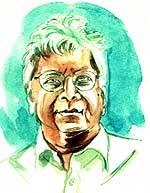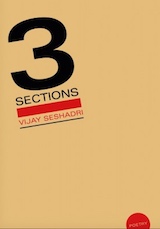Vijay Seshadri
|
Poet, essayist, and critic Vijay Seshadri was born in India and came to the United States at the age of five. He earned a BA from Oberlin College and an MFA from Columbia University. Brooklynite Vijay Seshadri’s life has taken him from his birthplace of Bangalore, India, to a childhood in Columbus, Ohio, a stint in the fishing industry in the Pacific Northwest, a Ph.D. from Columbia, and then to learning poetry and language in Pakistan. In the citation for the 2014 Pulitzer Prize, the committee called Vijay’s book 3 Sections, “a compelling collection of poems that examine human consciousness, from birth to dementia, in a voice that is by turns witty and grave, compassionate and remorseless.” His famous poem “The Disappearances” came in the aftermath of the September 11th attack on the World Trade Center. That poem summoned up, with acute poignance, a typical American household and scene—“the day is brilliant and cold,” a child in the yard, “poking a ground-wasps’ nest”—in the wake of the news of the assassination of President John F. Kennedy, in 1963: On a day like any other day, The combination of epic sweep (including the quoted allusion to one of Emily Dickinson’s Civil War masterpieces, from 1862) and piercing, evocative detail is characteristic of the contribution Seshadri has made to the American canon. This is you at the doorway, unobserved, Appreciative readers of Seshadri’s poems can recognize his expert assimilation of American poetry from Frost to Lowell, Bishop, and Ashbery, their tutelary spirits resplendently alive in a tradition he himself is significantly shaping with his own alchemical brand of poetic magic. Now he has joined their company on the list of winners of the Pulitzer. Seshadri has been an editor at The New Yorker, as well as an essayist and book reviewer in The New Yorker, The New York Times Book Review, The Threepenny Review, The American Scholar, and various literary quarterlies. He has received grants from the New York Foundation for the Arts, National Endowment for the Arts, the John Simon Guggenheim Memorial Foundation; and area studies fellowships from Columbia University. As a professor and chair in the undergraduate writing and MFA program at Sarah Lawrence College he has taught courses on ‘Non-Fiction Writing’, ‘Form and Feeling in Nonfiction Prose’, ‘Rational and Irrational Narrative’, and ‘Narrative Persuasion’.
|

 Birth— 1954
Birth— 1954 3 Sections
3 Sections